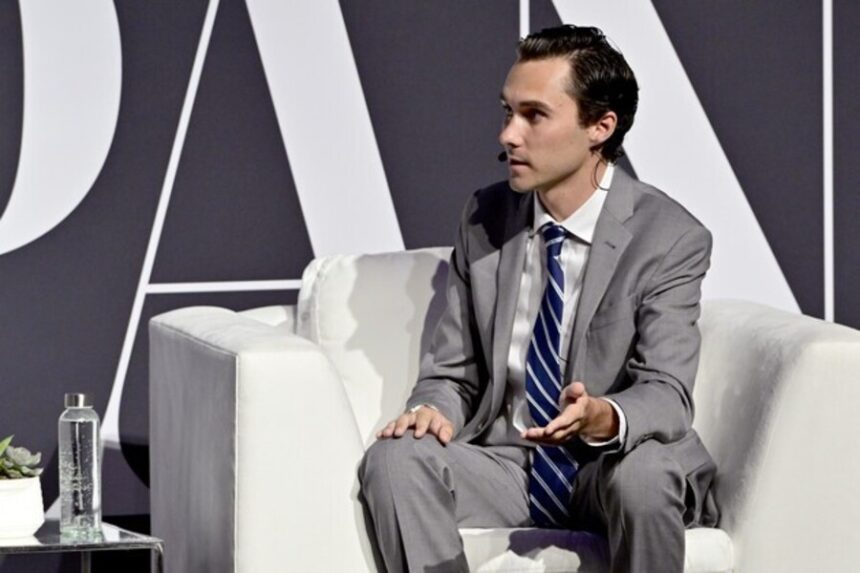In a move that deepens internal Democratic Party tensions, the Democratic National Committee’s (DNC) Credentials Committee voted Monday to recommend redoing the controversial February elections of David Hogg and Malcolm Kenyatta to party vice chair positions. The decision comes amid allegations of procedural violations and ongoing disputes about the role of party leaders in primary contests.
The committee passed a resolution concluding that the vice chair elections held earlier this year were “incomplete,” citing violations of the DNC charter. The resolution, which now awaits consideration by the full DNC, stipulates that a new vote must take place — but only among the original candidates who ran in the February contest.
At the heart of the challenge is a complaint filed by Kalyn Free, a Native American DNC member from Oklahoma who lost to Hogg in one of the vice chair races. Free alleges that the DNC combined two separate voting questions into a single tally, a move she says disadvantaged female candidates and violated gender balance rules enshrined in the party’s bylaws.
During a lengthy, and at times heated, committee session, representatives for Hogg and Kenyatta defended the original vote and questioned the legitimacy of overturning it. They argued that interpreting voting procedures falls within the purview of the DNC chair and warned that revisiting the outcome under revised rules could disenfranchise members who participated in good faith in February.
Nevertheless, the committee sided with Free’s objections. An alternative resolution proposed by Christine Pelosi — to uphold the original results — was rejected. Pelosi, the daughter of former House Speaker Nancy Pelosi, was one of several prominent figures attempting to shield the February results from being invalidated.
DNC Chair Ken Martin, who assumed leadership after the February vote, acknowledged the committee’s concerns in a statement issued Monday evening.
“I am disappointed to learn that before I became Chair, there was a procedural error in the February Vice Chair Elections,” said Martin. “I trust the full DNC will resolve this matter fairly and in accordance with our values.”
While Kalyn Free’s procedural challenge is technically unrelated to broader issues within the DNC, the case has reignited a simmering controversy surrounding David Hogg’s leadership role.
Hogg, 25, rose to national prominence as a survivor of the 2018 Parkland school shooting and has since become a high-profile advocate for gun control and progressive reform. More recently, he has drawn ire within the party for leading an effort to unseat incumbent Democrats whom he describes as complacent in the fight against former President Donald Trump.
Hogg’s political group, Leaders We Deserve, is preparing to spend up to $20 million backing primary challengers who align more closely with progressive causes. This campaign has alarmed several establishment Democrats, who argue that party leaders — especially those in official DNC positions — should not interfere in primary races.
In response to Monday’s vote, Hogg suggested that the decision to redo the election may have been politically motivated.
“It’s impossible to ignore the broader context of my work to reform the party which loomed large over this vote,” Hogg said in a statement. “The DNC has pledged to remove me. This vote has provided an avenue to fast-track that effort.”
The pushback against Hogg’s activism has been fierce among centrist Democrats. Matt Bennett, a former Bill Clinton advisor and co-founder of the moderate think tank Third Way, called Hogg’s actions “insane behavior from a DNC official,” accusing him of undermining party unity at a time of heightened national stakes.
Martin, who has emphasized the importance of neutrality within party leadership, also weighed in on social media: “Do I have opinions? Of course. But when you lead the institution tasked with calling the balls and strikes, you don’t get to swing the bat.”
The final decision now rests with the full Democratic National Committee, which must vote to approve or reject the Credentials Committee’s recommendation. If approved, a re-vote would be held under clarified procedures, potentially reversing the current appointments of both Hogg and Kenyatta.
This decision carries significant implications for the party’s internal governance, especially as it prepares for the 2026 midterm elections and the 2028 presidential cycle. It also raises questions about how much autonomy DNC officers should have in influencing candidate selection and shaping the party’s ideological future.
For Hogg, the stakes go beyond a procedural do-over. His broader campaign to transform the Democratic Party from within — by backing primary challengers and questioning institutional norms — appears to be triggering backlash from traditional power structures.
The DNC’s internal clash over procedural rules and political ideology underscores the ongoing battle for the future direction of the Democratic Party. Whether David Hogg’s vice chairmanship survives the next vote remains to be seen, but the outcome will surely reverberate far beyond party leadership, influencing how Democrats approach intra-party dissent, grassroots activism, and accountability going into a high-stakes election cycle.




